If you know The RVgeeks at all, you know that DIY RV maintenance is important to us. Why? Well, for one thing, it can save a LOT of money. Labor costs alone for a good RV tech are expensive, never mind potential markups on parts prices.
But even more important than the money-saving piece is the opportunity that DIY maintenance offers for RV owners to get to know their rigs well. REALLY well.
It’s important to understand your RV and how things work. Sometimes an issue that creates great inconvenience can be resolved quickly and easily if you know your rig and have a couple of simple tools on hand.
Oh, there are a few things we yield to the pros on, and there always will be. But there are a LOT of RV maintenance tasks that we tend to ourselves – the overwhelming majority, in fact.
In today’s post, we’re sharing seven RV maintenance tasks that you can easily do yourselves. Get to know your RV, save some time and money, and take pride in your accomplishments. Let’s go!
DIY RV Maintenance Saves Money and Time
We value our money and our time. Not paying someone else to do something we can do ourselves saves both.
We’re far too busy with our professions and our travel adventures to spend more time than is absolutely necessary looking for an RV tech, driving to their location, and waiting for an issue to be investigated and resolved. We live in an RV because we’ve got places to go – things to do – people to see.
Most maintenance projects take us far less time to tend to ourselves than would be required to seek the help of a technician. DIY RV maintenance is a money-saver AND a time-saver. We appreciate the savings in both categories, and we think you will, too.
Let’s take a look at seven important areas of an RV that require regular maintenance you’re almost certainly capable of doing yourself.
RV Roof Maintenance
Routine roof inspection and maintenance is an essential part of RV ownership. We can’t state this emphatically enough, because the damage that can result from a poorly maintained RV roof can be devastating.
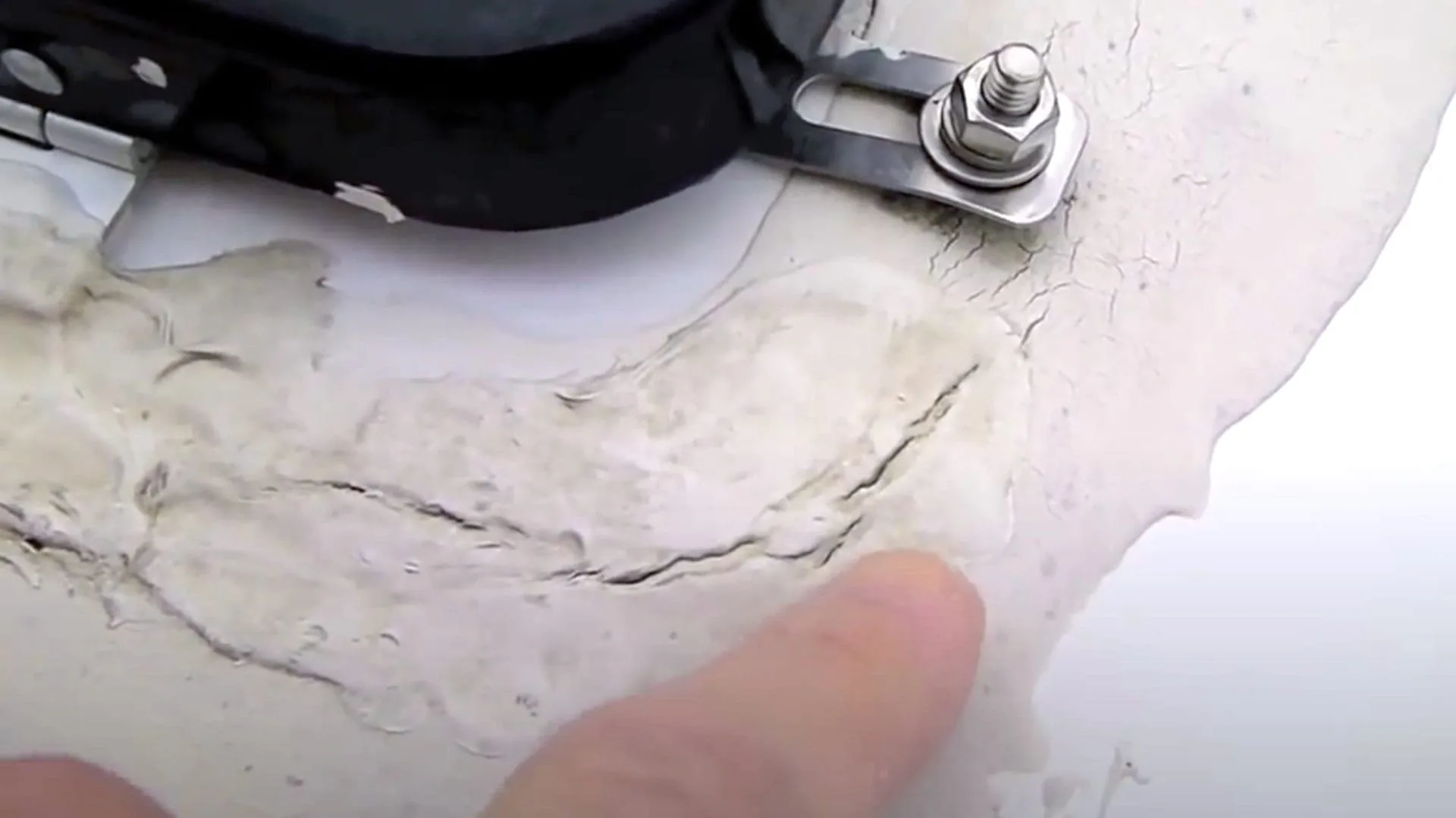
A quick check of the sealant around vents, fans, solar panels, air conditioners, and antennas at least a couple of times each year will keep your RV roof in great condition, avoiding potentially costly leaks.
Maintaining your RV roof isn’t difficult, but it’s important to note that not everyone is comfortable getting up and moving around on an RV rooftop.
First, it’s easier to climb onto and move around some RV roofs than others, and second, physical limitations can hinder the ability to get up onto an RV roof. If you’re an RV owner who falls into this category, you can have a friend, family member, or a professional help with your RV roof maintenance.
Here’s why roof maintenance is so important:
There are lots of things attached to your RV roof, and that means there are holes. You’ve got vent fans, a TV antenna, skylight, plumbing vents, maybe a satellite dish, air conditioner, or solar panel mounts, etc. Anything that gets screwed into your roof or that transitions through the roof into the interior of the RV has the potential to cause a water leak. And leaks have the potential to cause serious damage over time.
So what’s the secret to preventing that damage? Sealant. Products like Dicor Self-Leveling Lap Sealant and Eternabond tape are your friends in RV roof maintenance. But diligent, consistent inspection of the sealant over time is the real trick.
Age, the sun, tree branches can — all of these can damage sealants (or even the roof itself in some cases). Patching old, cracked Dicor isn’t difficult – but it’s very important to prevent leaks from causing potentially serious damage to your roof over time.
You (or someone else) should inspect your RV roof at least a couple of times each year to get a good look at the sealants to make sure they’re still doing their job. If it’s time to maintain the sealant, the video from this post should be helpful:
To see what can happen if you don’t maintain your roof, and water penetrates through poorly maintained areas, have a look at this video:
This post on repairing holes in your RV’s roof will be helpful as an overall guide to minor DIY RV roof repair.
And if you’re not sure what type of RV roof you have, take a look at our Complete Guide to Your RV Roof. The way an RV roof is maintained and repaired may vary based on what type of material it’s made from, so it’s important to know what kind of roof your RV has.
Some of the information in the posts and videos above may be a bit repetitive, but that’s not a bad thing if it makes clear the tasks that need to be accomplished.
Any way you slice it, regular RV roof inspection and maintenance is at the heart of keeping your rig out of trouble where insidious, potentially damaging leaks are concerned. That’s why it’s #1 on our list!
RV Slide-Out Maintenance
RV slide-out rooms have inner and outer seals that need to be maintained to work properly. This one is on our once-a-year maintenance list every spring, but here’s the good news: it’s probably the easiest RV maintenance task on our list.
There are commercial products for lubricating slide-out seals, but we can’t personally vouch for any of them because we don’t use them. When we bought our Mountain Aire over 16 years ago, Newmar recommended using baby (talcum) powder on the slide-out seals once a year. Having taken this advice to heart and maintained the seals in this way for 16+ years successfully, we can attest to Newmar’s good advice.
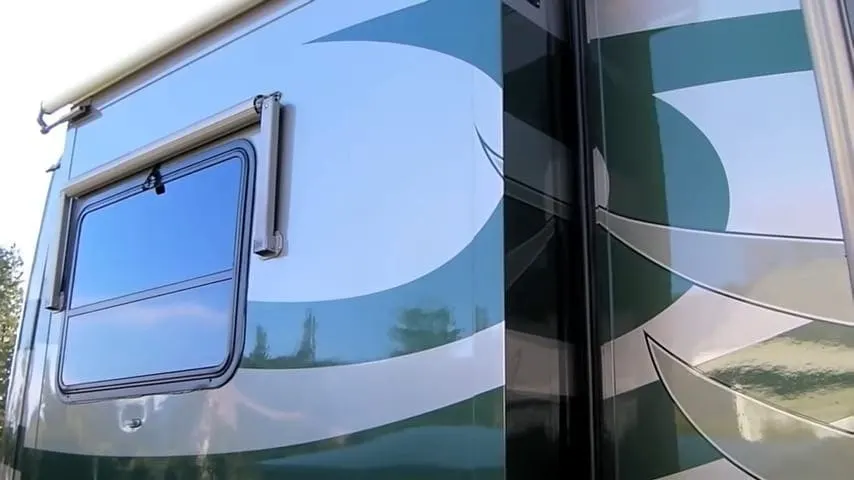
Maintaining our slide-out seals with baby powder has worked flawlessly for over 16+ years.
In addition to the fact that it works so well, baby powder is cheap and readily available. More importantly, the powder doesn’t attract dust and dirt the way many liquid products can. Which is definitely what you want to avoid. The idea here is to prevent the seals from sticking to the parts of the RV/slide-out that they come in contact with, keeping them intact and preventing them from tearing. Baby powder does just that — prevent sticking.
Baby powder is easy to apply using just an old sock or rag. To reach up under the slide toppers, we use an extendable pole, the same one we use for washing our RV. You can watch our entire process in the videos that are included in the two posts we just linked to in this paragraph.
NOTE: Talcum powder has been linked to ovarian cancer based on regular use over time. For many reasons, not the least of which is the fact that Peter is a cancer survivor, we take this very seriously and we respect the potential for danger with regular use of baby powder containing talc. Since we’re performing this task outdoors in the open air, and only once a year, we feel confident that we’re not in danger (we don’t have ovaries either).
For our purposes here, once a year we add some baby powder to our slide-out seals. We’re not using the powder elsewhere in our RV, nor are we using it on any sort of a regular basis.
Talc-free baby powder exists, with cornstarch as the active ingredient. We haven’t used cornstarch on our seals so we can’t personally vouch for it, but you can certainly contact the manufacturer of your motorhome for advice in this regard if you have concerns about talc-based baby powder.
RV Water Heater Maintenance
Another important piece of RV maintenance involves flushing and cleaning the water heater, and possibly replacing the anode rod. While this may sound like an intimidating task to tend to yourself, it really isn’t difficult, as long as you follow directions and use the proper tools. Fortunately, we’ve got a video that you can follow step-by-step, whether your water heater is a Suburban or Atwood brand.
We used to flush out our Suburban water heater using our tank rinsing wand and plain water, and we generally (but not always) replace the anode rod annually (only for Suburban water heaters, though, as Atwood water heaters have an aluminum tank that doesn’t require an anode rod).
We’ve learned from our investigation using a borescope that flushing the water heater using vinegar is much more effective than cleaning with water alone. You’ll see evidence of this in the video embedded above.
Take a look at the video to see if you think you can add cleaning your water heater (and checking and possibly replacing the anode rod if you have a Suburban water heater) to your RV maintenance list. We think you can!
RV Fresh Water System Maintenance
Can you sanitize your fresh water system as a DIY RV maintenance project? You bet you can!
Early this year we published a post entitled “How to Sanitize Your RV Water System”. Clicking on that link will give you a step-by-step guide telling you exactly how to sanitize the entire fresh water system using only a gallon pitcher, a measuring cup, and some plain liquid bleach.
If you’re not sanitizing your entire system including the hot and cold sides of the plumbing, but you simply want to sanitize the fresh water tank itself, this video we posted about ten years ago will show you how to do that.
Keeping your fresh water system clean is an RV maintenance task that you can do as a DIY project. Add it to your list, and let’s keep going!
Generator Maintenance
We have an Onan 7.5kW Quiet Diesel RV generator, and we like to do our own maintenance on this important piece of equipment. We’ve kept our generator running like a top all these years, so we consider ourselves adept at the tasks associated with regular generator maintenance.
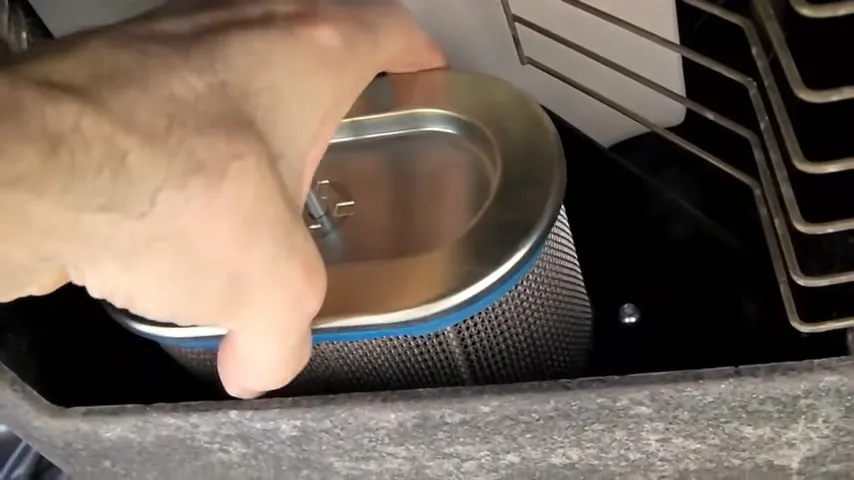
Changing the generator’s air filter is a regular part of our annual RV generator maintenance.
Generator maintenance is not difficult and, depending on which generator your RV has, you may wish to tackle your generator maintenance as well. But as always, the bottom line is whether or not you want to take on the task.
If you do, then keep reading, because we’ve got several RV generator maintenance tasks that might be right up your alley.
One important note, however: You may have a different generator than we have, so while we welcome you to follow along with our “how-to” videos for these projects, be sure to consult the owner’s manual for your specific make/model of RV generator if you have a different one. Also, our generator is on a slide-out, which does make things a lot easier to access.
The first RV generator project you may wish to undertake is actually a project consisting of three important tasks – changing the generator’s oil (and oil filter of course), replacing the air filter, and cleaning the spark arrester. This is not a difficult project, but depending on where your generator is located, it will likely require you to get on the ground to do some work.
With that in mind, take your time and follow the steps that we’ve laid out in this video entitled “Onan RV Generator Maintenance”. Once you’ve completed this triple-task project once, you’ll be confident in taking it on once a year as an important part of your RV generator maintenance (of course you should follow the maintenance schedule outlined in your owner’s manual).
Every two years we flush the cooling system and replace the anti-freeze and radiator pressure cap on our Onan. You can do this too, by following along with our video (linked in the previous sentence) detailing every step. Again, this particular task is a lot easier when your generator slides out the way ours does.
And finally, you’ll want to replace the fuel filter in your RV generator. Clicking on the link will take you to a step-by-step video showing you how to complete this surprisingly easy task.
Of course you may want to take your generator to a pro for service, and that’s a viable option as well.
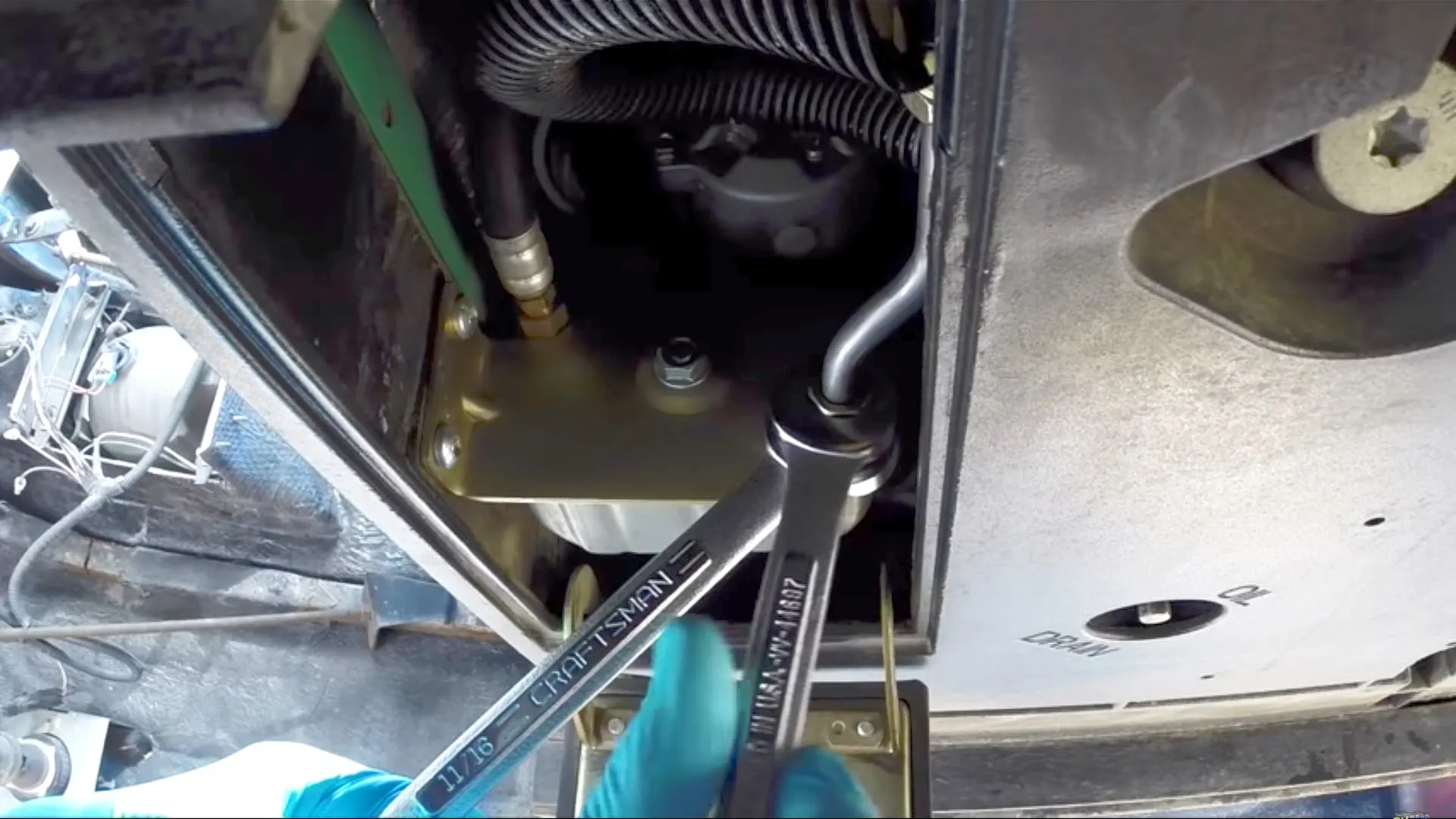
Your RV generator’s fuel filter should be replaced according to the schedule in your owner’s manual.
As with all of our DIY RV maintenance projects, you’ll want to gauge what jobs you’re up for and take it from there. There are some jobs we’d just as soon leave to the pros, too. But our RV generator maintenance is not among them.
Deep Cycle Battery Maintenance
We don’t currently use deep cycle batteries, but we do understand them. In fact, as featured speakers at the 2019 Xscapers Annual Bash in Lake Havasu City, AZ, we talked about the pros & cons of each type of battery available: RV Batteries – Flooded vs. AGM vs Lithium.
Deep cycle battery maintenance is very important if you want your batteries to last and provide the power you need, and it’s a task you can undertake yourself as part of your RV maintenance list.
In the following video, we demonstrate how to properly maintain and equalize flooded lead-acid RV “house” batteries. In this case, we were servicing four 6-volt deep-cycle golf cart batteries in a 5th wheel that belonged to friends. This video is ten years old and certainly not the quality of video we’d make today, but the information is still valid!
Engine Fluid Maintenance
And finally, a great RV maintenance task for anyone with a bit of a DIY spirit is engine fluid maintenance. Many of you are likely already doing some of these tasks on your own. But some of that choice (to DIY it or take it to the pros) may depend on the volume of fluid your dealing with. Our big diesel engine holds a LOT of oil, which is one reason we take it to the pros!
Essentially, fluid maintenance usually consists of a series of different items that need to be monitored and replenished or replaced as required. Depending on the type of motorhome your drive, they may include:
- Engine Oil
- Coolant
- Transmission Fluid
- Brake Fluid
- Power Steering Fluid
- Windshield Wiper Fluid
- Hydraulic fluid
- Wheel hub lubricant
Refer to your RV’s owner’s manual for information related to checking and replacing these fluids.
How Often Should You Do RV Maintenance?
There always seems to be an RV maintenance task that needs to be done. We’ve covered some of the important intervals within the context of this article in the appropriate sections.
In addition to those intervals and tending to matters that crop up from time to time, we have a long list of regular maintenance tasks that we do along with the spring cleaning of our RV. We set aside time for all of this, and we make sure to have on hand all of the supplies and tools we need to complete all cleaning and maintenance tasks. We came up with our schedule of maintenance tasks by referring to the owner’s manuals for all the components on our RV.
Another great option for tracking the maintenance schedule for your RV is the RV Life Maintenance Tracker, which is a service/website that’s a part of the RV Life suite of tools. If you’re already an RV Life PRO member, you have access. But, if not, you can sign up for RV Life PRO and save 25% using the following discount code:
RV Life Pro membership provides access to a suite of valuable tools (each one separately worth the cost of the whole package), including: RV Trip Wizard (trip planner); RV Safe GPS app (for...Show More
RV Life Pro membership provides access to a suite of valuable tools (each one separately worth the cost of the whole package), including: RV Trip Wizard (trip planner); RV Safe GPS app (for RV-specific navigation); CampgroundReviews.com (user reviews of RV Parks & campgrounds); iRV2.com (community forums); RV Life Maintenance Tracker (maintenance schedule tracking), and RV Masterclass (excellent educational material for all RVers).
Read Our Post All About The RV Life App
Save 25% on your first annual subscription to RV Life PRO by clicking the button. The discount will be applied when you click through to the payment page. Show Less
Conclusion
If you’re not used to tackling many RV maintenance tasks yourself, start with the one or two from this list that appear easiest to you, and take it slow. Before you know it, you’ll be doing many of your own RV maintenance projects, saving time and money, and getting to know your RV more thoroughly. That’s a win – win – win!
Geek Out with Us Every Week
Join our newsletter to learn about all things RV-related. Every week we offer free tips, tricks, product reviews, and more to our online community of RVers. So, whether this is your first time on the road or you’re a seasoned expert, we’d love for you to geek out with us!


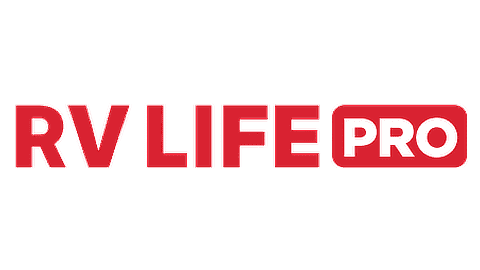
Dr. Mike
Saturday 18th of September 2021
Hi all Great information! What are your thoughts about servicing the Aqua Hot?
I have always learned a bit differently. I like to watch someone do the job (change the oil in the generator) and take notes and ask questions on what he does and the proper tools and parts used....then do it myself from there.
TheRVgeeks
Saturday 18th of September 2021
Hey Dr. Mike. We can't really say much about maintaining an Aqua Hot as we've never had one ourselves. But from what we've read online, there are a number of regular tasks that you can certainly do yourself to ensure it operates properly. Though (again, not from personal experience), we also understand that there may be some maintenance items that are best left to the pros.
Sorry we can't be of more help on this... mayb our next (?!?!) RV will have an Aqua Hot and we can make some videos for you! ????